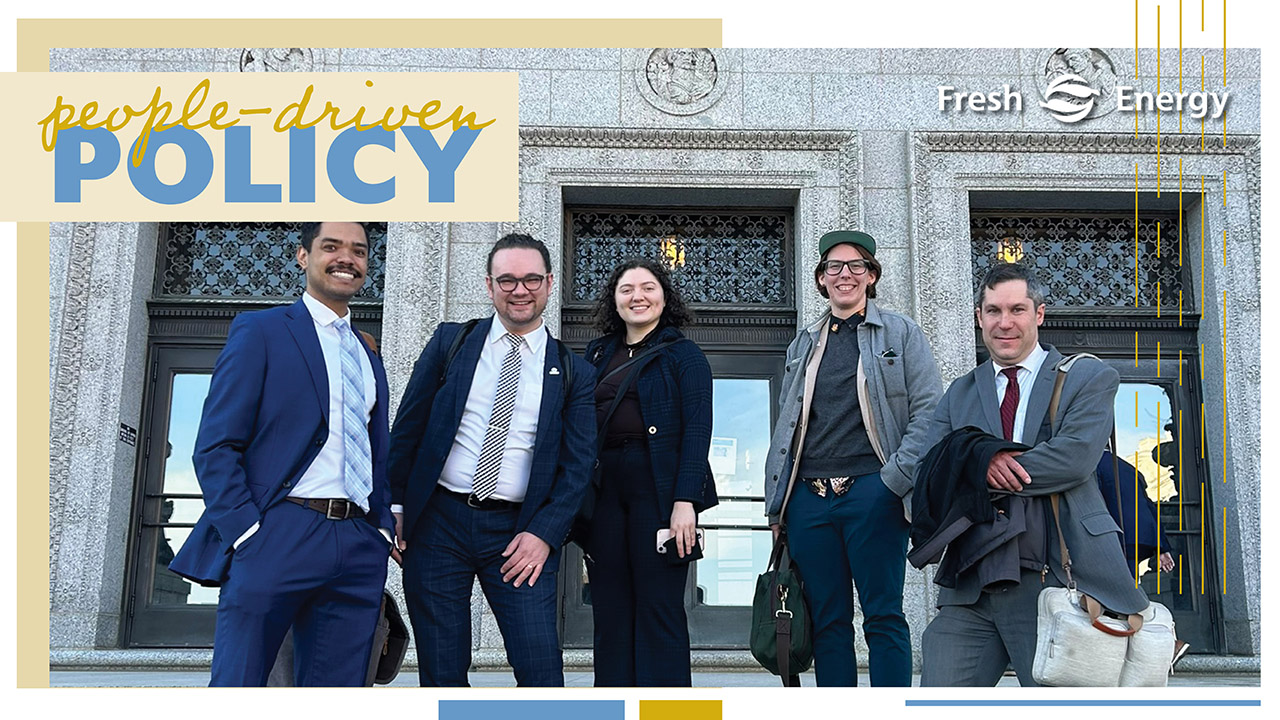Get the inside scoop! In our first episode of Decarbonize: The Clean Energy Podcast, J. discusses her big takeaways from the Global Climate Summit in Madrid and what COP25’s outcomes mean for Minnesota. J. also highlights some Minnesota businesses that were at the Summit and how they’re helping to move the needle and setting the pace for other businesses around the world.
Decarbonize: The Clean Energy Podcast is available on Apple Podcasts, Spotify, and more. You can also stream it online here.
December 15, 2019 | UN climate change conference ends with limited progress on emissions targets
The longest ever global meeting of the United Nations Framework Convention on Climate Change (UNFCCC) closed in Madrid on Sunday, December 15 just before 2PM.
Negotiators reached disappointing, minimus agreements on implementing the UNFCCC and the Paris Agreement, with far less ambition and progress than anticipated. The final text falls far short of the urgent action on the climate emergency called for by scientists and civil society. The text advises ambitious emissions cuts are needed globally if the Paris pledges will hold global heating to no more than 2°C. All countries must be more ambitious in 2020 to fulfill their Paris Agreement goal.
Fortunately, the European Union agreed its long-term target is to reach net zero emissions by 2050.
Australian, Brazil, and the United States would not agree to any ambitious plan to decrease greenhouse gas emissions. The U.S. has been the most disruptive Party at the COP25.
The adopted text includes some material on Article 6; the COP President stated that negotiators can use this material to reach a global carbon markets agreement at COP26 in November 2020.
The outcome of these negotiations emphasizes how critical 2020 will be for the world to ambitiously increased its climate action. UN Secretary-General Antonia Guterres said:
“I am disappointed with the results of COP25. The international community lost an important opportunity to show increased ambition on mitigation, adaptation, and finance to tackle the climate crisis. I am more determined than ever to work for 2020 to be the year which all countries commit to do what science tells us is necessary to reach carbon neutrality in 2050 and no more than a 1.5°C temperature rise.”
Thank you for following me on these posts. Next week I will announce the date to tune in hear me describe the most important efforts in the next months, and to get your questions answers; that will be in early January.
December 12, 2019 | The U.S. delegation has emerged as the main obstacle for poorer countries to reach a climate change compensation deal
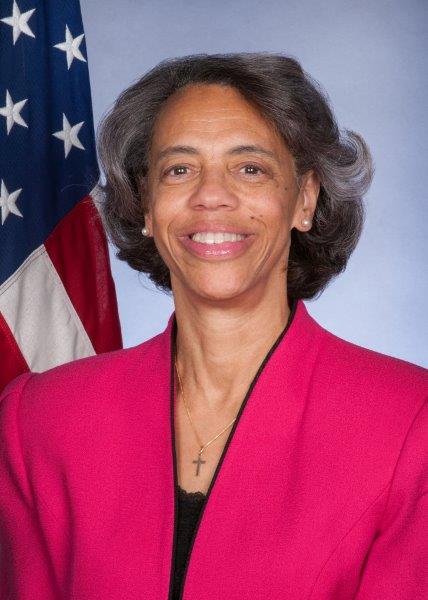
This morning I participated in a high-level meeting with the U.S. delegation to COP25. We met with Head of Delegation, Ambassador Marcia Bernicat (right), and Kim Carnahan, the U.S. Department of State’s Lead Negotiator (pictured below). All of the 30 American observors had a laser focus on the U.S.’s blocking of American financing of loss and damage incurred on poor nations.
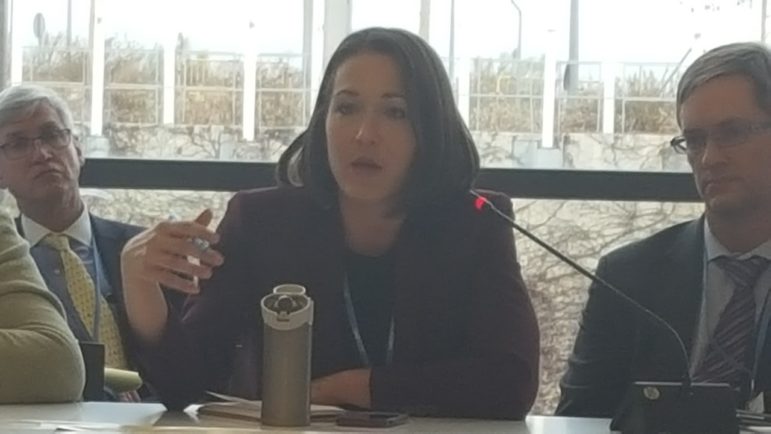
The U.S. delegation is allegedly trying to blow up one of the top priorities the world’s poorest nations are working to achieve at COP25: a mechanism for developing nations hurt by climate change to seek compensation from the wealthy nations that emitted the largest share of greenhouse gases. According to my discussions, developing nations expected to see something very concrete on how people facing the climate emergency can be helped. The reality is that nothing concrete has yet happened.
Yesterday Alpha Oumar Kaloga, a diplomat from Guinea who sits on a negotiating committee went public on his frustration:
“The obfuscating and delaying tactics of the U.S. in particular are designed to ensure that we get nothing. Other rich countries–the E.U., Norway, New Zealand, Australia, and Canada–must stand apart from the U.S. It is not acceptable to hide behind this climate criminal.”
We Americans meeting with the U.S. delegation leaders asked them over and over: Why is the U.S. using this year’s climate summit to try to ensure it will never have to pay for the damage climate change is doing to poorer countries?
Both of the leaders insisted–without presenting any evidence–that the diplomat was “untrue.”
The reality is multiple analyses by the U.N. and others say we need hundreds of billions of dollars for the level of loss and damage we expect climate change to wreak havoc on poorer nations. The salient question is, with the U.S. blocking of proper funding for loss and damage, how can the world mobilize these kinds of support?
We were frustrated by having been ensured a one-hour meeting; but the U.S. officials cut our prearranged meeting–invited by the Ambassador’s staff!– short after 30 minutes.
I see every justification the media headlines regarding the U.S. role in COP25 state: “The U.S. is once again the villain at the UN Climate Summit.” If the 200 parties to the negotiations do not develop a working finance mechanism for approval in 2020 at COP26, the market to pay for loss and damages will not work.
December 11, 2019 | The Right Side of History: Businesses and Investors Reached a Tipping Point at COP25
I’m reporting good news from today’s High-Level Event on Global Climate Action, convened by Carolina Schmidt Zaldivar, the Chilean minister of the environment and president of COP25, together with the U.N. Secretary-General, António Guterres.
The Corporate Climate Movement Grew Exponentially
Guterres announced that private capital is finally being deployed at scale. Therefore, the 1.5°C limit for climate change is still within the world’s reach.
Announced today, 177 companies have rallied behind the 1.5°C limit. In fact, the number of companies planning deep cuts in their greenhouse gas emissions has more than doubled in three months. The 177 companies have promised to set science-based targets in line with limiting global warming to 1.5°C. These companies span 36 sectors, are headquartered in 36 countries, and employee 5.8 million people. A particular hometown champion for me: Ecolab, headquartered in my Saint Paul, Minnesota, as are all 177, is taking steps to show that “we are in this” for the 1.5°C limit.
More strong support for net zero emissions: This week a group of investors managing close to U.S. $4 trillion in assets, committed to converting their portfolios to net-zero emissions as part of the Net Zero Asset Owner Alliance.
Seventy nations at the UN in September 2019 committed to zero carbon by 2050. Guterres added today:
“We need more countries to commit now to zero carbon by 2050, and all countries to make that commitment no later than November 2020.”
Act Boldly This Week to Save our Planet for Kids Growing Up Today
At today’s event I heard from the podium: “Children at this conference insist on calling us out for solving the climate emergency.” Schmidt and Guterres know well this proper insistence, and further inspired the 200 parties now wrapping up their two weeks of meetings, by engineering a live conversation with an astronaut from the International Space Station. Luca Parmitano acclaimed his vantage point that allows he and his fellow astronauts to see clearly the beauty and fragility of our planet. The astronaut called on leaders from 200 nations in Madrid to build on those positive tipping points in business and investment, to now do their work: Deliver climate action this week to save our planet.
December 10, 2019 | J. Drake Hamilton on the global stage today, talking about Minnesota leadership on big climate actions
I was streamed today on Facebook Live from the ground in Madrid at COP25, presenting about Minnesota leadership moving forward from the 2007 Next Generation Energy Act, through Xcel Energy’s exemplary climate action including commitments to 100% carbon-free energy by 2050, and the closing 10 years early of its two remaining coal plants, to the recent bold climate actions of the Minnesota House of Representatives and of Governor Tim Walz. It’s a 11-minute–take a view! My segment begins at 50:08.
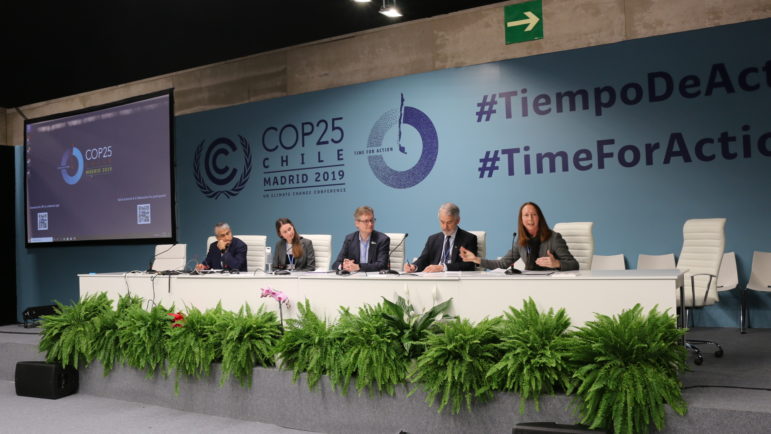
December 9, 2019 | Breaking news: 80 CEOs, so far, have signed Joint Labor Union and CEO Statement on the Paris Agreement
This afternoon I was at the official, unprecedented publicity of the Joint Labor Union and CEO Statement on the Paris Agreement, live from four of the CEO signers.
The letter is short and very clear, including: “The promise of the Paris Agreement is one of a just and prosperous world. We urge the United States to join us in staying in.” Andrew Liveris was in Madrid, and is the former chairman and CEO of The Dow Chemical Company; he said from the podium, “The unions are with us, and businesses are with the unions in the U.S. in support of the Paris Agreement.” Please read this path-breaking leadership below.
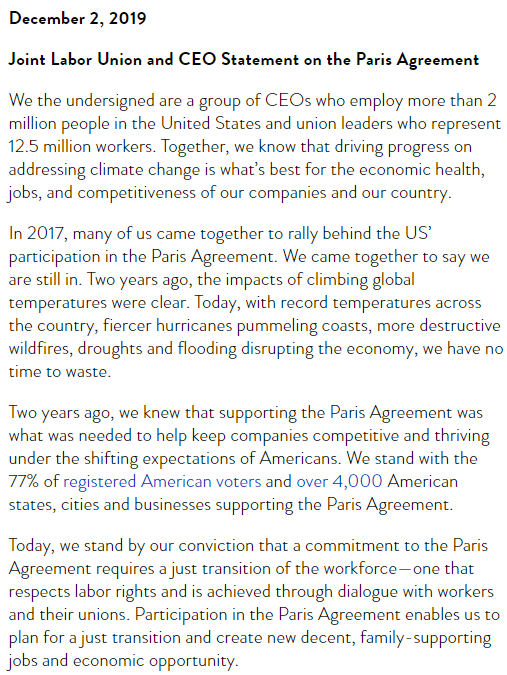
In addition to the AFL-CIO, the U.S. national union federation that represents more than 12.5 million working Americans, CEOs of three companies with important Minnesota presence also signed: The chairman and CEO of Ecolab, the chairman and CEO of Trane-Thermo-King-Ingersoll Rand, and the chairman and CEO of Cargill, the Minnesota company that has considerable influence in the world’s food system.
Cargill boosts global climate commitment
“Climate change left unchecked will destabilize the food system, as well as the farmers and ranchers at the heart of it,” David MacLennan, Cargill’s chief executive said. “We are determined to innovate, scale and implement solutions together with producers, our customers and governments worldwide.”
Minnetonka-based Cargill Inc. committed last week to reducing greenhouse gas emissions in its entire supply chain by 30 percent per ton of product in the next decade. The new target is known as a Scope 3 goal, encompassing emissions from Cargill’s suppliers and customers, which are both numerous and geographically diverse.
“Cargill doesn’t exactly know how it will achieve its 30 percent per ton reduction goal for its entire supply chain, but a large chunk will come in its North American beef business and new pilot programs for regenerative agriculture practices for farmers.”
A review of Cargill’s supply chain determined that a 30% emissions reduction would align with the Paris Agreement commitment for keeping global warming to “well below” 2°C from preindustrial levels.
U.S. Delegation meets with 50 American observers (including Fresh Energy) this afternoon
On Friday, the United States Department of State offered to meet with many nongovernmental organizations based in the U.S. who are observing COP25 on the Monday of this, the second (and ending) week of the climate summit. We were hosting this meeting with 50 badged observers to the COP25 work, and welcomed six professional negotiators and other staff to take our questions. I was selected from the American group to speak to the negotiators about the leadership of Minnesota’s legislature and governor in leading to cheap, fast, clean energy transformation so far, and poised to take more bold action.
The Department of State also agreed to find a time for the U.S. head of delegation, Ambassador Marcia Bernicat, to have an open meeting later this week with the observers from the United States. I will report out fully on both of these meetings in my post-COP25 webinar, to be held during lunchtime in Minnesota early in January; people can join the webinar for free.
I’ve also tweeted about some of today’s statements of import; please follow me @jdrakehamilton to stay connected.
More insights posted daily on Tuesday through COP25 ends on Friday, December 13. Enjoy!

December 5, 2019 | J. Drake Hamilton represents Fresh Energy the UN Climate Change Conference (COP25) in Madrid
COP25 to Be the Launchpad for Significantly More Climate Ambition
From the morning of December 7 I will be at the climate negotiations in Madrid, reporting back to you on the crucial commitments needed: bold, ambitious, and scalable climate actions from the nations. I will track how we’re operationalizing the scientific climate action consensus. You’ll hear from me most days for the next week. Expect me to report on committed actions at the scale of the climate change emergency. Early in January, Fresh Energy will host a free webinar to answer the frequent questions I’ve been getting.
This is my first benchmarking communication to you, to make sure you know what we need.
As the global climate emergency intensifies and greenhouse gas emissions continue to grow, governments have gathered now in Madrid for the UN Climate Change Conference COP25 (concluding on 13 December 2019) to take the next crucial steps in the UN climate change process.
The conference takes place under the Presidency of the Government of Chile and will be held with logistical support from the Government of Spain.
Progress I’ll Track by the Subnational U.S. Delegation in Madrid
Two years ago, US cities, states, tribes, cultural organizations, businesses, faith groups, and universities asserted their power as American climate leaders. Stepping in for the federal government, their presence at the UN Climate Summit has been key to their mission to maintain and achieve bolder American progress in its national climate goals. The U.S. Department of State sent a small team of negotiators to Madrid this year, but the American public’s voice on climate action will be best represented by US subnational and non-state actors.
Minnesota’s delegation to Madrid includes people representing 3M, Cargill, Fresh Energy, the Science Museum of Minnesota, the State of Minnesota, Target, and the University of Minnesota. I will focus on those vital voices with you in these communications. Expect live tweets from me @jdrakehamilton and daily updates posted at the top of this blog.
With my Minnesota colleagues, we will meet with foreign governments and international counterparts to build connections, strengthen partnerships, and find opportunities to advance American interests and collaborate to tackle the climate emergency.
You’ll get the inside scoop directly from midwestern farmers, and from state officials, businesses, and organizations headquartered in Minnesota.
What Needs to Be Scaled Up Immediately
Patricia Espinosa, Executive Secretary of UN Climate Change said:
“This year, we have seen accelerating climate change impacts, including increased droughts, storms and heat waves, with dire consequences for poverty eradication, human health, migration and inequality.”
“The world’s small window of opportunity to address climate change is closing rapidly. We must urgently deploy all the tools of multilateral cooperation to make COP25 the launchpad for more climate ambition to put the world on a transformational path towards low carbon and resilience.”
A key objective of COP25 is to raise overall ambition also by completing several key aspects with respect to the full operationalization of the Paris Climate Change Agreement.
“While we have seen some progress with respect to climate-related financing for developing countries, we will continue to urge developed nations to fulfil their pledge of mobilizing $100 billion annually by 2020,” Ms. Espinosa said. “We also must see overall global finance flows reflect the deep transformation throughout society that we need: away from carbon-heavy investment and towards more sustainable and resilient growth. Drops in the bucket are not enough: we need a sea change.”
COP25 to Set the Stage for Enhanced NDCs
In 2020, nations are to submit new or updated national climate action plans, referred to as Nationally-Determined Contributions, or “NDCs”.
According to the UN Environment Programme’s 2019 Emission Gap Report published this week, unless global greenhouse gas emissions fall by 7.6 percent each year between 2020 and 2030, the world will miss the opportunity to get on track towards the 1.5°C temperature goal of the Paris Agreement.
This means collective ambition would need to increase more than fivefold over current levels to deliver the cuts needed over the next decade for the 1.5°C goal.
The scientific community knows that is “achievable, but to stabilize global temperature rise by 1.5 Celsius by the end of this century, we need to reduce emissions 45 per cent by 2030 and achieve climate neutrality by 2050. It’s an extremely difficult challenge, but meeting it is absolutely necessary to the health, safety and security of everyone on this planet—both in the short- and long-term.”
With regard to raising ambition, COP25 will be informed by the outcomes of the Climate Summit in New York in September co-organized by UN Climate Change this year. We saw a groundswell of new action in the United States, including from states, cities, businesses, and American investors. Those new contributions are critical to embolden the climate and energy transformation we need. I will report to you by live-tweeting and in these blogs: what are the action commitments that are new at this crucial focus time?
Remember: The UN calls on nations to upscale their climate action by 2020, and work together towards achieving net zero CO2 emissions by 2050.
The UN Chief said he expected all governments to commit to review their national climate action plans – Nationally Determined Contributions or “NDCs” – with the necessary ambition to tackle the climate emergency in the course of the coming 12 months up to COP26, the date by which governments need to submit updated and enhanced plans. The Chair of the Intergovernmental Panel on Climate Change (IPCC), Hoesung Lee, pointed to the economic benefits of more ambitious climate action, which could generate opportunities for investment in innovation.
“These investments would generate powerful benefits spilling over to all sectors of society and the economy, making them cleaner, healthier and more resilient,” said Lee.
This week, Carolina Schmidt, Chile’s Environment Minister, was formally elected President of the COP. She reminded delegates that work needed to be taken forward at COP25 which can then be captured in improved national climate action plans under the Paris Agreement next year.
“We need to make new and more ambitious commitments which include all of the aspects of climate action: mitigation, adaptation and means of implementation. The main vehicle to stimulate more ambition are the Nationally Determined Contributions,” said Schmidt.
Fresh Energy will be especially interested in solid new commitments from the largest emitters; China, India, the EU and Japan are viewed with varying degrees of optimism during the second week of COP25 – it’s the conventional timing for making deeper emissions cuts.
In his speech at opening the climate summit, Spain’s Prime Minister, Pedro Sanchez, underlined the importance of women in climate action. Mr. Sanchez celebrated the memory of an American woman scientist who back in 1856 was the first to identify CO2 warming effect.
“I wanted to start by evoking the memory of Eunice Foote for two reasons: first, to rescue her memory, and the memory of so many other women scientists, from the injustice of oblivion,” said Mr. Sanchez. “Second, to remind everyone that it has been a long time since science started warning us about climate change.”
About the UNFCCC
With 197 Parties, the United Nations Framework Convention on Climate Change (UNFCCC) has near universal membership and is the parent treaty of the 2015 Paris Climate Change Agreement. The main aim of the Paris Agreement is to keep a global average temperature rise this century well below 2°Celsius and to drive efforts to limit the temperature increase even further to 1.5°Celsius above pre-industrial levels. The ultimate objective of the Paris Agreement and the 1992 UNFCCC is to stabilize greenhouse gas concentrations in the atmosphere at a level that will prevent dangerous human interference with the climate system, in a time frame which allows ecosystems to adapt naturally and enables sustainable development.
November 18, 2019 | Preparing for COP25
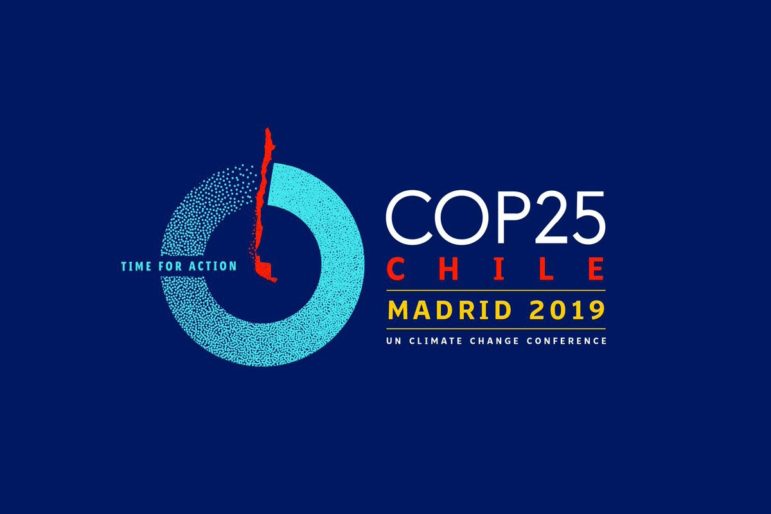
This December, Fresh Energy’s science policy director, J. Drake Hamilton, will travel to Madrid, Spain, to participate in the United Nations 25th Conference of the Parties to the United Nations Framework Convention on Climate Change (COP25). The COP25 summit will bring together an estimated 35,000 people from almost 200 countries with the goal of accelerating joint climate action in all nations to meet the reductions of greenhouse gas emissions needed to avoid the worst damages of climate change.
This is J.’s fifth time attending this summit, which is part of the ongoing United Nations negotiations that created the landmark 2015 Paris Climate Agreement. Although President Trump has initiated the process to withdraw the U.S. from the Paris Agreement, Minnesota and other states in an American majority remains committed to climate action, including meeting the goals of the Paris Agreement.
Hamilton will be posting daily updates from the summit beginning on December 2. She anticipates giving readers timely news on the most impactful parts of the negotiations.
If you are interested in receiving updates about what will be happening at this global summit, please fill out the form below. J. will be hosting a post-event reflection webinar on the results of the negotiations the week of January 6, 2020, stay tuned for details.
Follow J. on Twitter and Fresh Energy on Facebook for all the latest news.


